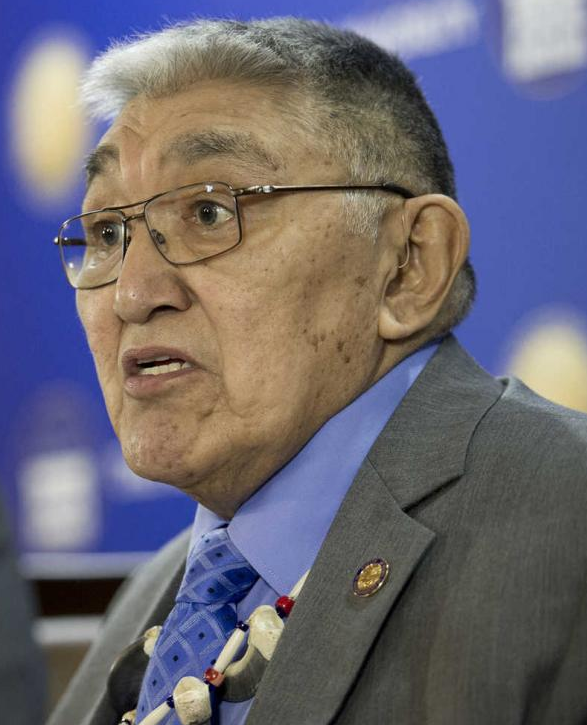Anchorage Superior Court Judge Andrew Guidi has given Rep. Benjamin Nageak, D-Barrow, the victory in his House District 40 primary, reversing the result on Election Day in August.
According to the recounted and certified results of the election, Dean Westlake defeated Nageak by a margin of eight votes: 825-817.
In a decision dated Thursday, Guidi ordered the Alaska Division of Elections to reduce Westlake’s total by 12 votes and Nageak’s total by two votes, resulting in a final tally of 815-813 in Nageak’s favor.
“At the conclusion of its retabulation, the Division of Elections shall certify Mr. Nageak as the winner of the Democratic primary in H.D. 40,” Guidi wrote.
The case is already bound for an appeal to the Alaska Supreme Court, with oral arguments scheduled for Wednesday, but Guidi’s decision is an important one because the Supreme Court has traditionally been reluctant to overturn a lower court decision without cause.
House District 40 encompasses the North Slope and Northwest Arctic boroughs, and no Republican is in the running for the Legislative seat that represents the district. That means whoever wins the primary will be seated in the Legislature.
Nageak, an incumbent Democrat in the North Slope, caucuses with the Republican-led House majority. During the campaign prior to the August primary, the state Democratic Party chose to back his opponent as part of an effort to create a more equal majority coalition in the House.
Republicans, with no candidate of their own in the race, backed Nageak. Rep. Lance Pruitt, R-Anchorage, declared at a fundraiser that Nageak is one of the best Republican members of the House.
During oral arguments in front of Guidi, Nageak attorney Tim McKeever called former GOP state chairman Randolph “Randy” Ruedrich to the stand as an expert on elections.
An attorney for Westlake turned to the Democratic campaign manager for similar reasons, but Guidi found Ruedrich’s 20 years of experience “more authoritative and reliable” than the Democrat’s four years.
McKeever successfully overcame a tall task in overturning the results of the August primary.
Under state law, he had to prove “malconduct” — that elections officials made mistakes, that those mistakes changed the results of the election, and that those mistakes were deliberate.
Those standards were met in two precincts, Guidi said: Shungnak, a town of about 260 people in the Northwest Arctic Borough; and Kivalina, a coastal town of about 370 people also in the Northwest Arctic Borough.
In Kivalina, seven voters cast two ballots after demanding a second ballot. The Division of Elections initially counted the seven ballots as duplicates, but during the recount, decided to count them.
“The court finds that this decision was in error,” Guidi wrote.
While Kivalina had problems, “the most significant irregularities in the August 2016 primary election took place in the Shungnak precinct,” Guidi wrote.
In that precinct, all 51 voters voted twice: they cast both Republican and Democratic ballots when they should have been allowed to pick only one.
Although Nageak and Westlake appeared only on the Democratic ballot, forcing everyone to vote the Democratic ballot slanted the election, Guidi found. Some Republicans would have picked the Republican ballot and would not have voted in the Nageak-Westlake race.
When poll workers offered each voter two ballots, they “violated clearly established constitutional rights as well as the requirements of statutory law,” Guidi wrote. “Given the constitutional dimensions of these actions and the scale on which they occurred, it is the opinion of this court that they constitute election malconduct.”
In his ruling, Guidi found Shungnak officials acted “in reckless disregard of the requirements of the law,” and that the Division of Elections bears some responsibility because it is “their employer, trainer and supervisor.”
Giving two ballots to every voter “cannot be characterized as an ‘honest mistake,’” Guidi wrote, because if he were to do so, it “would undermine the credibility of the election and incentivize similar ‘honest mistakes’ in the next election cycle. This would be a terrible message to send.”
Having ruled the Kivalina and Shungnak elections flawed, Guidi determined that because Shungnak was a “heavily pro-Westlake precinct,” the effect of the error “was not neutral; it biased the vote total in favor of Mr. Westlake.”
With that in mind, he ruled that 11 Westlake votes should be stricken from the tally in Shungnak and one Nageak vote should be stricken from the tally there. In Kivalina, each candidate lost one vote.
The final result, after subtraction, erased Westlake’s eight-vote advantage and gave Nageak the win.
Related stories:
Nageak says he’s not leaving lawsuit
Nageak’s lawsuit against state election officials headed to trial Tuesday

